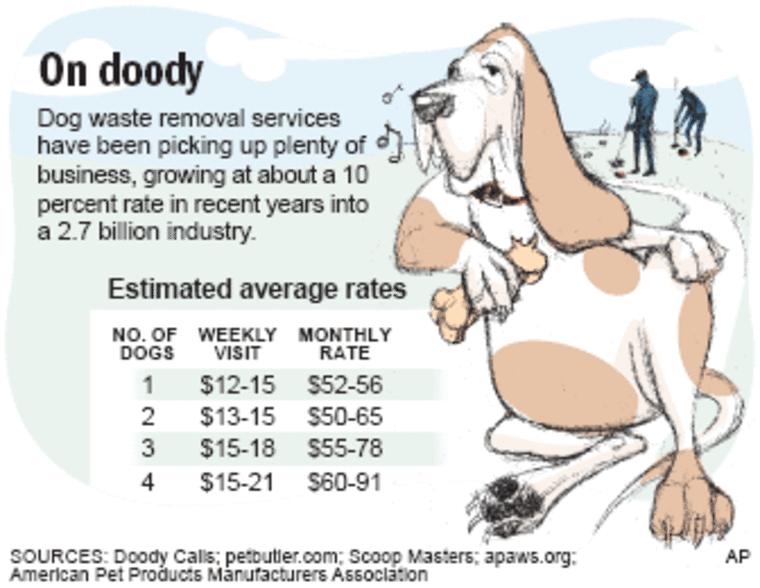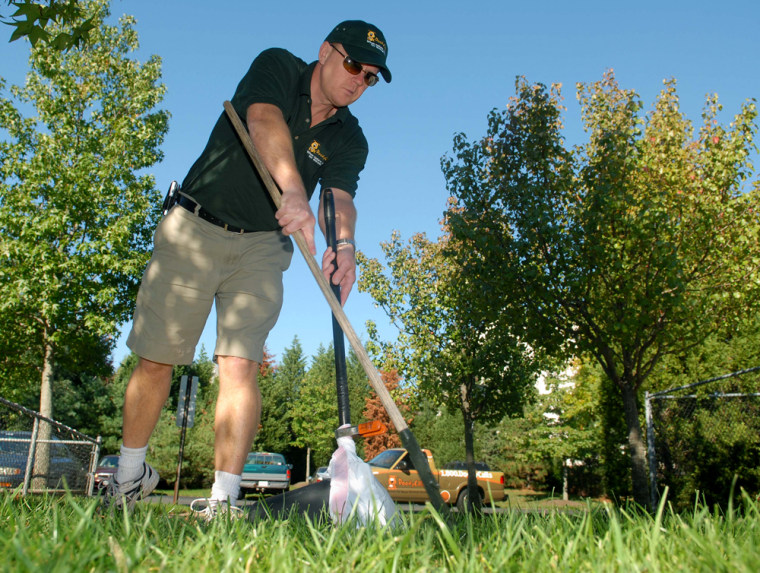Doug Barnhart was so repulsed by the notion of picking up dog poop that he hired a service to do it.
But he is gradually overcoming his revulsion now that he’s planning to open his own scoop shop later this year in Virginia Beach, Va.
“I’ve been going into my neighbors’ yards and practicing, steeling myself,” Barnhart said.
Barnhart is starting a franchise of Palmyra, Va.-based Doody Calls, part of a small but rapidly growing niche in the pet-care industry focused on pet-waste pickup.
Doody Calls launched in 2000 with two University of Virginia graduates who picked up dog waste on weekends. Now it has more than $1 million in annual revenue and roughly 1,500 clients in seven states — Maryland, Virginia, Massachusetts, Oregon, Texas, Massachusetts and Connecticut — and the District of Columbia.
Until very recently, poop-scooping was the exclusive domain of small, locally based businesses, if service was offered in an area at all. But Doody Calls and Frisco, Tex.-based Pet Butler — operating in 14 states with expected revenue of $2.5 million this year — introduced the franchise concept to the industry in 2004 and are adding new locations at a steady clip.
Today, pooper-scooping represents a fraction of the pet-care services industry, which has grown at about a 10 percent rate in recent years into a $2.7 billion industry, according to the American Pet Products Manufacturers Association. Baby boomers with expendable income and empty-nest syndrome have helped make the services sector the fastest-growing part of the pet industry. Much of that growth has come from luxury services like doggie day spas and in-home day care.
For some, outsourcing poop pickup duties falls in the category of a luxury.

“If you think back ten years ago and somebody told you you could develop a national franchise in scooping poop, you would have marveled at the lunacy of it,” APPMA President Bob Vetere said. “It truly is a luxury item when you can hire someone to come in and clean your yard when you could walk out back with a plastic bag and gloves and do it yourself.”
Deb Levy, vice president of the Association of Professional Animal Waste Specialists (APAWS) and founder of Yucko’s Poop ’n Scoop service in St. Louis in 1990, said pooper-scooping didn’t really take off until 2000. Franchising is simply an extension of that growth.
Levy estimates about 400 companies nationwide offer scoop services in one form or another. The association counts 119 members, most with pun-heavy names like The Grand Poohbah and Scoop De Doo, and will hold its fourth annual convention January in Las Vegas, complete with scooping races, Levy said.
Doody Calls founder Jacob D’Aniello, 29, said that with 40 percent of American homes owning at least one dog, he has found a gold mine in all those lawn land mines.
Most people dismissed his idea as kooky when he started out, but he was convinced the business had moneymaking potential, he said.
“If everyone had thought this was an awesome idea, it would have been done 100 times already,” D’Aniello said. “But when 40 percent of the population is out there doing something they don’t want to do, it’s a business opportunity.”
Barnhart, a semiretired shipping company executive who hopes to have his Virginia Beach franchise up and running by December, said he’s not particularly concerned if the job doesn’t carry much social status.
“I’m married. I don’t need to impress any women,” Barnhart said.
The founder of Pet Butler, Matt “Red” Boswell — who likes to refer to himself as the company’s “chief excrement officer” — said he was insulted when his girlfriend first suggested to him the idea of a poop-scooping business.
“I saw myself in Armani suits,” said Boswell, who at the time was holding down three jobs, including Cadillac salesman. “But once I got over the pride factor, and really got into it, it was the best job in the world. I was outside, in nice yards. Low stress.”
Boswell said he employs seven full-time scoopers for his company-owned franchise, which covers Dallas and Fort Worth. Their salary can surpass $30,000 plus use of a company truck.
D’Aniello said his scoopers earn similar amounts, with the wage depending in part on how many yards they clear in an hour.
Early on, D’Aniello and his wife Susan, a co-founder of the company, did much of the scooping themselves. The business grew slowly at first, and word-of-mouth advertising was slow because many customers didn’t like to admit they paid somebody else to clean up after their dogs.
Slowly, though, as neighbors see the brightly painted trucks on the street and more neighbors sign on, a street reaches a sort of tipping point. “The service as a whole is gaining acceptance,” he said.
Prices can vary depending on numbers of dogs and yard sizes, but Doody Calls generally charges $15 a week for weekly scooping services.
Laurie Conroy, a Doody Calls customer in Wellesley, Mass., with four dogs, said the service is worth it at almost any price.
“It’s a nice luxury to have. I did not enjoy cleaning up after my pets,” said Conroy, who signed up with a local service several years ago in Connecticut and immediately looked for a similar service when she moved to Wellesley. “Our yard is so much cleaner. The kids can run around barefoot in the summer.”
John Bright, originally from Manchester, England, opened a Doody Calls franchise in the famously dog-friendly city of Alexandria, Va. He said the franchise dovetails nicely with his UK business, supplying and managing pet waste stations in public areas like parks.
In England, though, poop-scooping hasn’t caught on.
“People aren’t willing to spend money on this sort of thing over there,” he said.
